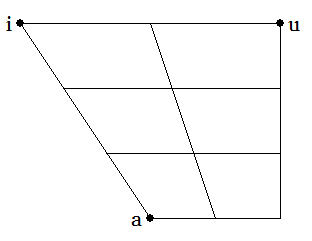User:Chrysophylax/vigintiquattuorhoras
Culture
Hunter-gatherers living in the primeval forests of Europe!
Need moare words for bovids!!
Organization
- Hunting ‘pack’, three a five males per unit
- Basket-weaving women, elders, and children
- No writing system
- Pooled resources
- ‘Family’ units of ~50 individuals
- Polytheistic worshippers of anthropomorphic animal and surrounding-inspired deities (All fear Prom! God of Thunder and Fertility)
- Ride battle-reindeer into battle.
Phonology
Vowels
Three phonemic vowels
Consonants
Sparse inventory.
/p/ /t/ /k/ /m/ /n/ /l/ /r/ /s/ /w/ /j/
Nominal morphology
Case
- Nominative
Marked nominative system, use -i
- Genitive
Formed by prefixing of a- onto the possessum with the possessor following afterwards.
- Oblique
Formed by suffixing -(a)ta
Number
No distinction. Plurals are formed by determiners such as twipi ‘many’, stupi ‘few’, and so on.
Verbal morphology
Aspect
Perfective
In non-perfective stemsm formed by vowel stem change i>u.
e.g., √kwit- ‘utter’ → kwut- ‘said, spoke’ (kwuta ‘I spoke, I said’)
Progressive
Often unmarked, else formed by waj- prefix
e.g., wajtatara ‘(he) is/was killing’, from √tat- 'to be dead' and -(a)ra 'creates a causative verb'
Continuous
Is formed by stem-final -VC replication.
- kwitit- < √kwit-
- tatit- < √tat- (tatita ‘I am dying’)
Stative
Used for verbs indicating a state of existence. Can be formed by stem vowel change i>a.
e.g., tatu ‘you are dead’
Person suffixes
- first person; -a
- second persen; -u
- third person; unmarked
e.g. kwitita, kwititu "I am speaking, you are speaking"
Syntax
object verb time manner place subject
tatu ra pwati - ‘Now you are dead cow’
anata tataru atwajtata uru asu skwamki - ‘You have killed me with your embrace snake’,
- anata tatar-u a-twajt-ata uru asu skwamk-i
- me killed-2s possessum-embrace-obl 2s with snake-nom
Words
- tlit, south
- klit, north
- twajk, light
- √tat-, (stat) to be dead; with -ara to kill; with s-/u, to die, e.g., stautu ra! ‘Now you die!’ trad. war cry. ; with -it, to be dying.
- √twijt-, (pfv) to kiss; with waj- to be kissing someone; with i>a to be kissed, to begin to be kissed
- √tirm-, (ipfv) to want; with s-i>u,(pfv) to take; with -ara, to tease
